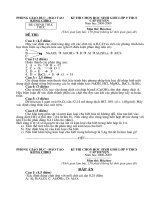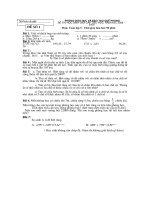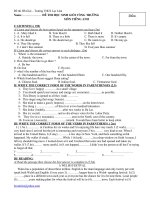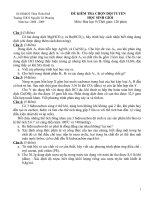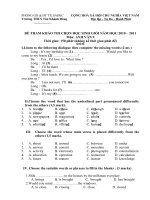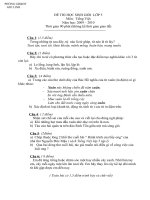Đề thi hs giỏi T. Anh 9
Bạn đang xem bản rút gọn của tài liệu. Xem và tải ngay bản đầy đủ của tài liệu tại đây (194.58 KB, 8 trang )
- 1 -
SỞ GD&ĐT QUẢNG NINH KỲ THI CHỌN HỌC SINH GIỎI CẤP TỈNH
LỚP 9 NĂM HỌC 2010 - 2011
ĐỀ THI CHÍNH THỨC
(Đề thi này có 6 trang)
Chữ ký
của giám thị
Môn: Tiếng Anh (bảng B)
Thời gian làm bài: 150 phút, không kể thời gian giao đề
SBD:
1:
Ngày thi: 24/3/2011
Họ, tên thí sinh:
Số phách
Ngày sinh:
chấm lần 1:
2:
Nơi sinh:
Học sinh trường:
Ban coi thi:
Số phách
chấm phúc khảo:
Điểm bài thi
chấm lần 1:
Bằng số: ……….……….………
Bằng chữ:
…………………….……………….……
Họ tên, chữ ký của hai người
chấm lần 1:
1: ………………………… …………………………………
2: ………………………….……… …………… ………….
Số phách
chấm lần 1:
Số phách
chấm phúc khảo:
Điểm bài thi chấm phúc khảo:
Bằng số: ……….……………… …….………
Bằng chữ:
…………………….……………………….…….……
Họ tên, chữ ký của hai người
chấm phúc khảo:
1: ………………………… …………………………………
2: ………………………….……… …………… ………….
Ghi chú: Thí sinh trả lời ngay vào bài thi này. Nếu viết sai phải gạch bỏ rồi viết lại.
PART I. PHONETICS, VOCABULARY AND GRAMMAR. (7,0 pts)
I. Circle the letter (A, B, C, or D) which has the underlined part pronounced
differently from the others in each group.
1. A. know B. show C. follow D. now
2. A. mountain B. count C. young D. found
3. A. teach B. cheap C. school D. church
4. A. stays B. says C. ways D. days
5. A. celebrate B. festival C. respond D. wedding
- 2 -
II. Circle the letter A, B, C or D next to the best answer to complete each sentence
below.
1. A widower is a man _______wife has died and _______ has not married again.
A. whose-who B. whose-whose C. who-who D. who-whose
2. He was successful _______ making money.
A. to B. in C. on D. for
3. A(n)_________ is a sudden violent shaking of the earth‟s surface.
A. snowstorm B. earthquake C. volcano D. typhoon
4. I think I hear someone ________ the back window. Do you hear it, too?
A. trying open B. trying to open C. try opening D. tried to open
5. Lan goes to________ church every Sunday with her parents.
A. a B. an C. the D. no article
6. She had her suit __________ two weeks ago.
A. pressured B.washed C. washing D. wash
7. A holiday in America can be __________ cheap.
A. surprise B. surprised C. surprising D. surprisingly
8. I haven‟t seen you __________ last June.
A. since B. for C. in D. on
9. The robbery took place in __________.
A. a busily shopping street B. a busy street shopping
C. busy shopping street D. a busy shopping street
10. “I can‟t understand how you missed the exit.”
“Well, it was so dark, __________.”
A. we could see the road signs hardly
B. hardly we could see the road signs
C. we could see hardly the road signs
D. we could hardly see the road signs
11. Look! The yard is wet. It__________last night.
A. must rain B. couldn‟t have rained
C. must have rained D. should have rained
12. They are fond _________ jokes.
A. of telling B. to tell C. to have told D. telling
13. What time ________ on television?
A. is the news B. are the news C. is the new D. are news
14. Tom doesn‟t know the answer and Jenry doesn‟t________.
A. too B. neither C. either D. so
15. You can‟t use my car________ you bring it back tomorrow.
A. as long as B. when C. unless D. in spite of
III. Read the text below. Use the word given in capital at the end of each line to form
a word that fits in the space in the same line. 0 is an example.
A POPULAR WRITER
Emma Harte, in Barbara Taylor Bradford‟s novel, was a poor (0) lonely LONE
girl who became the (1) ____________ owner of an international chain WEALTH
of stores. Like the woman she writes about, Ms Bradford is beautiful
and (2) ________________. She left school at sixteen and became a AMBITION
(3) _____________. After twenty-three years of this work, she made the JOURNAL
- 3 -
(4) ______________ to start writing novels. She is now one of the most DECIDE
(5) ___________ - paid novelists in the world. Was Emma Harte‟s story HIGH
based on Ms Bradford‟s own incredibly (6) _____________ life? “I‟m SUCCESS
afraid not”, she said with (7) _____________ . “My life has been quite AMUSE
different from Emma Harte‟s. She was (8) ____________ to be born in LUCK
a poor family. I came from a middle-class home and I‟m (9) __________ HAPPY
married to a rich American film producer. The only thing I share with
my heroine is her (10) ____________ to work hard”. ABLE
IV. Choose the underlined word(s) that is incorrect in each of the following
sentences. Circle the letter A, B, C or D which is under the word(s) you choose.
1. She couldn‟t come in time because of she missed the bus.
A B C D
2. If there is too many exhaust fume in the air, more and more people will cope with
A B C D
respiratory problems.
3. Jean cloth was completely made by cotton in the eighteenth century.
A B C D
4. The bus arrived lately, so I missed my first class.
A B C D
5. They had so a good meal at the restaurant that they wanted to go there again.
A B C D
PART II. READING (6,5 pts)
I. Read the text below and choose to the best word to complete the text. Circle the
letter A, B, C or D which stands next to the answer you choose.
WHO IS REALLY ON THE INTERNET?
One of the great things about the Internet, as well as one of its biggest problems, is
that people are basically anonymous on it. In Internet chat rooms and web cafés, people
can use a different name and even create an entirely different identity if they want to.
In some ways, this is a good thing. For many people, it gives them the chance to
do things that they could never do in real life. For example, a person might be very shy in
real life, but that same person may find the courage to make friends on the Internet
because it feels safer. In addition, people in some countries are not free to express their
opinions, especially if they don‟t like the government. By using a different identity on the
Internet, they can express their opinions without worrying about getting in trouble.
That same freedom to be “another person” on the Internet, however, causes many
problems as well. The major problem is Internet fraud. Many dishonest people use the
Internet to pretend to be a different person. Then they trick a person into trusting them in
some way and take their money. In one case, two Japanese men lied to Filipinos who
wanted to travel to Japan. The two Japanese men told them that they could help them get
visas to Japan for a small price (about $ 400 per person). The two Japanese men took
thousands of dollars from hopeful Filipinos, but none of the people ever got their visas.
The number of these kinds of crime is quickly rising. Last year, Internet criminals stole
over $ 350 million from trusting people. When you consider that only $ 57 million was
- 4 -
stolen in bank robberies in all of Europe, it is easy to see that Internet crime is a serious
problem.
1. The word „anonymous‟ in bold in paragraph 1 is closest in meaning to _______.
A. nameless B. dishonest C. trusting D. criminal
2. According to paragraph 2, all of the following are true of the Internet EXCEPT
_______.
A. it allows people to safely oppose their government
B. it makes it easier for people to express themselves
C. it gets people in trouble
D. it helps shy people make friends
3. The word „they‟ in bold in paragraph 2 refers to _______.
A. people B. countries C. opinions D. friends
4. The author mentions two Japanese men in order to _______.
A. suggest that there is a lot of Internet crime in Japan.
B. show that getting a visa is very difficult in Japan.
C. give an example of fraud on the Internet.
D. show that you shouldn‟t trust anyone on the Internet.
5. Why does the author mention bank robberies?
A. To show that there is more money in Internet crime than in robbing banks.
B. To suggest that Internet crime is easier than robbing banks.
C. To show that Internet crime is much more common than other types of crime.
D. To show that banks are safer than the Internet.
II. Read the text below and choose to the best word to complete the text. Circle the
letter A, B, C or D which stands next to the word you choose.
There is much more water than land (1)__________ the surface of the earth. The sea
and oceans (2)__________ nearly four-fifths of the whole world, and only one-fifth of
(3)_________ land. If you travelled over the earth (4)_________ different directions, you
would have to spend much more of your time (5)__________ on water than on roads or
railways. We sometimes forget that (6)_________ every mile of land there is four miles
of water. There is much water on the surface of our earth that we (7)_________ to use
two words to describe. We use the word seas (8 )_________ those parts of water surface
which (9)_________ only a few hundreds of miles wide, the word oceans to describe the
huge areas of water which are thousands of miles wide (10)________ very deep.
1. A in B on C from D over
2. A covered B covering C cover D to cover
3. A them are B its C it is D it‟s
4. A. in B for C to D by
5. A moving B to move C move D moved
6. A on B in C within D for
7. A must B should C have D would
8. A describing B describes C to describe D describe
9. A have B is C are D will be
10. A then B and C but D also
- 5 -
III. Fill each the numbered blanks in the following passage with ONE suitable word.
Food plays an important (1)__________ in the development of nations. In countries
(2)_________ food is scare people have to spend most of their (3)__________ getting
enough to eat. This usually slows down progress (4)__________ men have little time to
devote to science, industry, government, and art . In nations where food (5) __________
plentiful and easy to get, men have more time to (6) _________ on activities that lead to
progress and enjoyment of leisure. The problem of providing good food for everybody
has not yet (7) __________ solved. Many wars have been fought (8)_________ food. But
it is no longer necessary to go to war for food. Nations are beginning to put scientific
knowledge to work for a solution of their food problems. They work together in the Food
(9)__________ Agriculture Organization of the United Nations (FAO) to help hungry
nations produce (10)__________food.
PART III. WRITING (6,5 pts)
I. Complete the second sentence so that it has a similar meaning to the first one,
begin with the given word(s) or phrase.
1. Calling the police isn‟t good.
It‟s ____________________________________________
2. I don‟t want you to buy me a present.
I‟d rather _______________________________________
3. The builder is going to mend my roof tomorrow.
I‟m going to have ________________________________
4. She can‟t find any good jobs because of her age.
She is too_______________________________________
5. She turned off all the switches with care.
All the switches__________________________________
6. They managed to finish the project in time for the presentation.
They succeeded __________________________________
7. “ Do you like listening to music, Dad?” asked Hoa
Hoa _______________________________________
8. I am not at all interested in Chemistry.
Chemistry _______________________________________
9. If you want my advice, I would forget about buying a new house.
If I ____________________________________________
10. The class was cancelled because there were not enough students.
There were _____________________________________
II. Using the words given below to write the complete sentences.
1. Vietnam/one/countries/ Association/ South East Asian Nation
______________________________________________________________
2. the word/ “jeans”/ come/ kind/ material/ be/ make/ Europe
______________________________________________________________
3. Internet/ be/ very/ fast/ convenient way/ us/ get/ information
______________________________________________________________
4. he/ enjoy/ read/ books/ morning.
______________________________________________________________
5. Mary/ not/see /mother/ since/ get married.
______________________________________________________________
- 6 -
III. You are Nam, a member of Quang Trung English Speaking Club. Tomorrow,
you are going to make a speech at your Club. Write a speech about the benefits of
learning English well (about 150 words).
……………………………………………………………………………………………
……………………………………………………………………………………………
……………………………………………………………………………………………
……………………………………………………………………………………………
……………………………………………………………………………………………
……………………………………………………………………………………………
……………………………………………………………………………………………
……………………………………………………………………………………………
……………………………………………………………………………………………
……………………………………………………………………………………………
……………………………………………………………………………………………
……………………………………………………………………………………………
……………………………………………………………………………………………
……………………………………………………………………………………………
……………………………………………………………………………………………
……………………………………………………………………………………………
……………………………………………………………………………………………
……………………………………………………………………………………………
……………………………………………………………………………………………
……………………………………………………………………………………………
……………………………………………………………………………………………
……………………………………………………………………………………………
……………………………………………………………………………………………
……………………………………………………………………………………………
……………………………………………………………………………………………
……………………………………………………………………………………………
……………………………………………………………………………………………
……………………………………………………………………………………………
___________hÕt__________
- 7 -
SỞ GD&ĐT QUẢNG NINH HƯỚNG DẪN CHẤM THI CHỌN HỌC SINH GIỎI TỈNH
LỚP 9 NĂM HỌC 2010 - 2011
ĐỀ CHÍNH THỨC
Môn: Tiếng Anh (BẢNG B)
PART I. GRAMMAR AND VOCABULARY. (7,0 điểm)
I. 1 điểm. Mỗi câu đúng 0,2 điểm
1. D
2. C
3. C
4. B
5. C
II. 3,0 điểm. Mỗi câu đúng 0,2 điểm
1. A
2. B
3. B
4. B
5. D
6. B
7. D
8. A
9. D
10. D
11. C
12. A
13. A
14. C
15. C
III. 2,0 điểm. Mỗi câu đúng 0,2 điểm
1.wealthy
2. ambitious
3. journalist
4. decision
5. highly
6. successful
7. amusement
8. unlucky
9. happily
10. ability
IV. 1,0 điểm. Mỗi câu đúng 0,2 điểm
1. C
2. B
3. C
4. A
5. A
PART II. READING (6.5 điểm)
I. 2,5 điểm. Mỗi câu đúng 0,5 điểm
1. A
2. C
3. A
4. C
5. C
II. 2,0 điểm, mỗi câu đúng 0,2 điểm
1. B
2. C
3. B
4. A
5. A
6. D
7. C
8. C
9. B
10. B
III. 2,0 điểm, mỗi câu đúng 0,2 điểm
1. part
2. where
3. time
4. because/as/since
5. is
6. spend
7. been
8. for
9. and
10. more/much
PART III. WRITING (6.5 điểm)
I. 2,0 điểm. Mỗi câu đúng 0,2 điểm.
1. It‟s no good calling the police/ It is not good to call the police.
2. I‟d rather you didn‟t buy me a present.
3. I am going to have my roof mended tomorrow (by the builder)/ I am going to
have the builder mend my roof tomorrow.
4. She is too old to find any good jobs.
5. All the switches were turned off with care.
6. They succeeded in finishing the project for the presentation.
7. Hoa asked her Dad if/whether he liked listening to music.
- 8 -
8. Chemistry doesn‟t interest me/ isn‟t interesting to me at all.
9. If I were/ was you, I would forget about buying a new house/wouldn‟t buy a
new house.
10. There were not enough students so the class was cancelled.
II. 1,5 điểm. Mỗi câu đúng 0,3 điểm.
1. Vietnam is one of the countries of the Association of South East Asian Nations.
2. The word “jeans” comes from a kind of material that was/ is made in Europe.
3. The Internet is a very fast and convenient way for us to get information.
4. He enjoys reading books in the morning.
5. Mary hasn‟t seen her mother since she got married.
III. 3,0 điểm (Mở bài: 0,5 điểm; thân bài: 2,0 điểm; kết luận: 0,5 điểm).
Yêu cầu thí sinh viết đúng thể thức của một bài diễn văn (có mở bài, thân bài
và kết luận), nêu một số lợi ích của việc học giỏi tiếng Anh như: Học giỏi tiếng
Anh sẽ có cơ hội giao tiếp với người nước ngoài bằng tiếng Anh, biết thêm nền
văn hóa, phong tục tập quán của người nước ngoài; có cơ hội học tiếp lên đại học
và cơ hội tìm được việc làm phù hợp với bản thân. Học giỏi tiếng Anh có thể đọc
được sách tiếng Anh để tiếp thu nền văn minh và khoa học kỹ thuật tiên tiến trên
thế giới. Đặc biệt trong thời kỳ hội nhập thế giới thì việc học giỏi tiếng Anh càng
có tầm quan trọng trong việc giao lưu với các nước về mọi lĩnh vực như văn hóa,
văn nghệ, thể thao, giáo dục, khoa học, kỹ thuật, công nghệ thông tin, thương
mại Nếu thí sinh viết đúng chủ đề, đúng ngữ pháp, dùng từ chuẩn xác, đoạn văn
không quá ngắn (khoảng 150 từ) mới cho điểm tối đa.
Tổng số: 20 điểm
Ghi chú: Điểm toàn bài để điểm lẻ, không làm tròn số.

